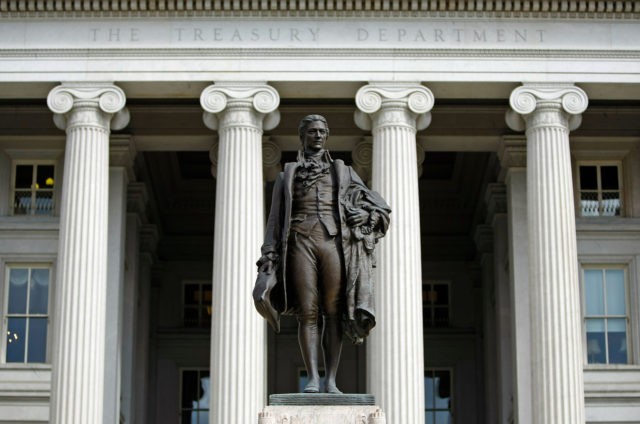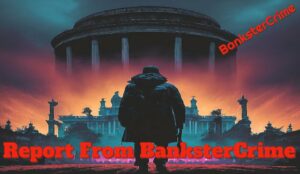(Reality–New World Order Pukes ) Our President Knows the End Is Near With the Current Financial Apparatus…

The U.S. government spent more than $3.13 trillion than it collected in taxes in fiscal year 2020, borrowing the difference from investors in the U.S. and abroad, the Treasury Department said Friday.
At the same time, interest rates have plummeted. The yield on the 10-year Treasury is down 57 percent from the expiration of the last fiscal year.
Federal revenue from taxes, fees, and other charges totaled $3.42 trillion, a one percent decline from the 2019 fiscal year, due to the contraction of the economy as the pandemic and measures to fight its spread took hold. Most of the shortfall occurred after March, when large parts of the economy were brought to a halt in an attempt to arrest the spread of coronavirus.
The Trump administration’s budget, authored months prior to the pandemic, had projected revenues of $3.7 trillion, $286 billion higher than what the government collected.
Spending rose 47 percent to $6.5 trillion, largely due to the four pandemic relief bills passed by Congress in March that authorized an aggregate of $2.4 trillion in spending. The largest of these, the CARES Act, came with a $1.7 trillion price tag.
The Trump administration’s budget had estimated spending would come in $1.762 trillion lower than it did, about the size of the CARES Act.
The U.S. government considers money taken from workers and businesses through the tax system to be “revenue,” although unlike private sector revenue it is received not through voluntary sales transactions but mandatory collections. The largest source of tax revenue is individual income taxes, which collected $1.6 trillion in 2020. That was $203 billion lower than the budget estimate and about $100 billion below the prior year’s revenue. It was around $23 billion more than the U.S. government collected in income taxes in fiscal year 2017, the last year before the Trump administration’s reforms cut taxes for almost all U.S. taxpayers.
When the government spends more than it collects in taxes—as it has nearly every year in recent decades, apart from a brief surplus in the late 1990s—it turns to investors to borrow funds. Investors send dollars from bank accounts to the Treasury and receive dollar-denominated bonds into securities accounts at banks. In effect, investors swap on-demand bank liabilities for longer-term savings vehicles.
That’s been a trade that investors have warmed to as the economy has contracted and the deficit expanded. The yield on the benchmark 10-year Treasury fell more than a full percentage point from 1.83 percent at the start of the year to 0.743 percent on Friday.

A rising tide of debt, an ebb in interest rates.
The total amount of federal government debt held by the public rose to $21 trillion, a 25 percent jump since the beginning of the year.
Total Federal borrowing from the public increased by $4.216 trillion during FY 2020 to $21.019 trillion. In addition to the $3.1 trillion in borrowing to finance the deficit, this includes $1 trillion in borrowing related to other transactions such as changes in cash balances and net disbursements for Federal credit programs.
The cost of servicing the debt owed by the federal government declined by nine percent last year due to falling rates.
Interest rates the government pays on newly interest debt have fallen despite the larger supply because investors believe that short-term interest rates, which are largely determined by the Federal Reserve’s monetary policy, will remain lower for longer than they had forecast prior to the pandemic. The Fed last year had said it planned on moving rates up gradually, leading many investors to believe rates were on auto-pilot glide upward. This year, in reaction to the pandemic, the Fed dropped its interest rate target to nearly zero and announced a new policy more tolerant of inflation that will likely keep rates lower than they would have been otherwise.
Although the terms “budget deficit” or “budget gap” suggests that spending financed through borrowing has a lower quality than spending financed through taxes, there is no evidence to back up this notion. Nor do larger budget deficits or a rising national debt tend to push up interest rates, as decades of rising debt and falling rates indicate. A more accurate portrayal would see taxes as subtracting the net worth of the private sector while boosting the net worth of the government sector, in perfect balance, while bond issuance leaves the net worth of the private sector and government sectors the same. The deficit is not a hole in the budget so much as a change in the maturity of the financial assets held by the private sector and the liabilities of the government.
Because deficits allow government spending to expand without shrinking the private sectors’ wealth, they may encourage the economy to recover more rapidly following a contraction. Although some economists have claimed the private sectors’ spending contracts in anticipation of future tax hikes to pay for the borrowing, decades of experience make this doubtful. Past deficits do not push up taxes and so consumers would have no reason to save more to pay them.
Some libertarians suggest that deficit-financed spending is superior to tax-financed spending because deficits are funded by voluntary bond purchases instead of mandatory taxes. Indeed, government bond sales may be closer to what the private sector considers “revenue” than tax collections because investors receive a financial product in exchange for their money.
Many economists view the current budget as unsustainable in the long-run, although there is little evidence for the claim and financial markets do not indicate any pending problems with inflation or debt capacity. Indeed, the U.S. government appears to be far from the limits of its borrowing capacity and the Federal Reserve does not think inflation will rise to its two-percent target for years to come.
Even those experts who think the government will need to raise taxes think that this should be delayed until the pandemic is in the rearview mirror. President Donald Trump has said he would cut taxes further if re-elected. Democrat nominee Joe Biden has promised to immediately reverse the tax cuts enacted in 2017, a move that would be a risky fiscal contraction as long as the pandemic is still ravaging the economy.
Source: breitbart
StevieRay Hansen
Editor, BankstersCrime
God often uses men who are not of the best moral character. Pharaoh, Nebuchadnezzar, Cyrus, Herod, and Trump (amongst others), to accomplish His will in events He orchestrates during human history. We either trust the sovereignty of God or we don’t. Nothing happens apart from Him…
The best index to a person’s character is how he treats people who can’t do him any good, and how he treats people who can’t fight back…
The Birth Pains Are Growing Stronger….
One of the signs of ruling class collapse is when they can no longer enforce the rules that maintain them as a ruling class. When the Romans started making exceptions to republican governance, it was a matter of time before someone simply decided the rules no longer applied to them. Perhaps the robot historians will consider Obama our Marius or Sulla. Maybe that person is in the near future. Either way, the rule of law is over and what comes next is the rule of men.
“Don’t piss down my back and tell me it’s raining.” Outlaw Josey Wales
WE NOW LIVE IN A WORLD THAT IS PURE FABRICATION

![]()




